|
|
|
Sort Order |
|
|
|
Items / Page
|
|
|
|
|
|
|
| Srl | Item |
| 1 |
ID:
102429
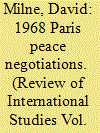

|
|
|
|
|
| Publication |
2011.
|
| Summary/Abstract |
This article draws on fresh archival research to challenge Robert Putnam's 'Two Level Game Theory'. In his seminal article, 'Diplomacy and Domestic Politics: The Logic of Two Level Games', published by International Organization in 1988, Putnam contended that international negotiations proceed at the domestic level and at the international level. In taking diplomatic initiatives forward, leaders are compelled to respond to the needs of domestic constituencies, through granting concessions and building coalitions, while international negotiations are pursued with one goal in mind: that any agreement will not damage the domestic political calculus. This article contends that Lyndon Johnson's actions in 1968 disprove this thesis. The President was in fact relaxed about a Richard Nixon victory in the general election as his commitment to defend South Vietnam from communism was stronger than that of his sitting Vice President, Hubert Humphrey. The President's concern for the fate of South Vietnam thus superseded his concern for his 'normal supporters'- the Democratic Party at large - who had become so hostile towards his management of the Vietnam War.
|
|
|
|
|
|
|
|
|
|
|
|
|
|
|
|
| 2 |
ID:
102433
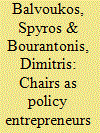

|
|
|
|
|
| Publication |
2011.
|
| Summary/Abstract |
Chairs have a significant potential effect on the bargaining structure and conduct of multilateral negotiations, addressing collective action problems that arise in decentralised bargaining. We examine the role of the Chair as a policy entrepreneur in multilateral negotiations, identifying the parameters that increase the Chair's entrepreneurship potential and condition the outcome of the Chair's entrepreneurial activities. We cluster the identified parameters in three groups of organisational attributes, comprising the Chair's mandate, available resources and (formal) constraints, in particular decision-making rules. We use this typology to analyse four important case studies within the UN setting.
|
|
|
|
|
|
|
|
|
|
|
|
|
|
|
|
| 3 |
ID:
102438
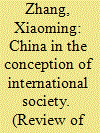

|
|
|
|
|
| Publication |
2011.
|
| Summary/Abstract |
Since Martin Wight's famous LSE lectures in the late 1950s, the English School scholars have brought China into the conception of international society. As the English School scholars have been 'inventing' an international society, China's status in the conception, or conceptions of international society has also been invented and reinvented. The Chinese case vividly demonstrates how a non-European (or non-Western) country, as one of 'the others', has been dealt with and brought into the conceptualisation of international society by the English School. China's status in the conception of international society, to a great extent, has been invented by some of the English School scholars with Eurocentric bias.
|
|
|
|
|
|
|
|
|
|
|
|
|
|
|
|
| 4 |
ID:
102437
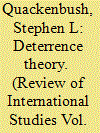

|
|
|
|
|
| Publication |
2011.
|
| Summary/Abstract |
Although deterrence theory was a central focus in the study of International Relations during the Cold War, attention has shifted away from deterrence since the end of that conflict. Nonetheless, deterrence is a general phenomenon that is not limited to any particular time or space. Moving beyond a simple focus on the US-Soviet relationship, scholars have recently begun further explorations of deterrence, through development of theory, analysis of policy alternatives, and empirical analysis. This article seeks to evaluate where deterrence theory stands today through: (1) a consideration of distinctions between different strands of theory; (2) a discussion of the assumption of rationality in deterrence theory; (3) an examination of three important distinctions in deterrence; (4) an evaluation of the difficult task of testing deterrence theory, and (5) an overview of recent theoretical developments. The primary conclusion is that perfect deterrence theory provides a logically consistent alternative to classical deterrence theory and therefore provides the most appropriate basis for further theoretical development, empirical testing, and application to policy.
|
|
|
|
|
|
|
|
|
|
|
|
|
|
|
|
| 5 |
ID:
102424
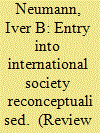

|
|
|
|
|
| Publication |
2011.
|
| Summary/Abstract |
This article addresses how entry into international society has been conceptualised, suggests a reconceptualisation that will make the concept more relational, and illustrates with a case study. Part one attempts a summary of relevant debates without the English School, and directs attention to the importance of how entrants draw on memories of its subject position in the suzerain system that it left as it entered international society. Part two discuses the experiences of Russia's predecessor polities, with the focus being on the place of Russian principalities within the suzerain system of the Golden Horde (ca. 1240-1500). I argue that Russia's basic stance towards European polities in the 16th and early 17th centuries is readily understandable in terms of a key memory, namely the one of being dominated by this polity, which was itself an outgrowth of the Mongol empire. Part three demonstrates how the resulting understanding of politics was confirmed by Russian experiences in the 16th and 17th centuries. I suggest that Russia never really let go of its memories of being part of a suzerain system, and that it is therefore still suspended somewhere in the outer tier of international society.
|
|
|
|
|
|
|
|
|
|
|
|
|
|
|
|
| 6 |
ID:
102443
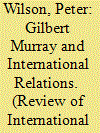

|
|
|
|
|
| Publication |
2011.
|
| Summary/Abstract |
Gilbert Murray was one of the towering figures of 20th century cultural and intellectual life, and the foremost Hellenist of his generation. He was also a tireless campaigner for peace and international reconciliation, and a pioneer in the development of international intellectual cooperation, not least in the field of International Relations (IR). Yet in IR today he is largely forgotten. This article seeks to put Murray back on the historiographical map. It argues that while in many ways consistent with the image of the inter-war 'utopian', Murray's thinking in certain significant ways defies this image. It examines the twin foundations of his international thought - liberalism and Hellenism - and their manifestation in a version of international intellectual cooperation that while aristocratic and outmoded in some respects, nonetheless contains certain enduring insights.
|
|
|
|
|
|
|
|
|
|
|
|
|
|
|
|
| 7 |
ID:
102425
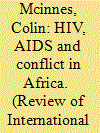

|
|
|
|
|
| Publication |
2011.
|
| Summary/Abstract |
The causes and consequences of HIV and AIDS are social are well as biomedical. Given the scale of the pandemic, understanding the social dimensions of HIV and AIDS is vital. One key argument is that there is a link between conflict and the spread of HIV. This appears to be particularly the case for sub-Saharan Africa where high levels of HIV prevalence are matched by violent conflict and state instability. Recent evidence however suggests that HIV prevalence does not always increase in conflict and that in some instances it may even reduce. This article attempts to explain why HIV has not increased in some sub-Saharan conflicts. To do this it moves beyond the use of risk factors to offer a new explanation based on susceptibility and vulnerability. It uses this explanation to examine four cases - Sierra Leone, Angola, Rwanda and the Democratic Republic of the Congo (DRC) - where conflict did not lead to a significant increase in the prevalence of HIV. The article concludes that, despite the fears of a few years ago, conflict does not readily act as a vector for the spread of HIV, though the potential for this to occur does still exist under certain circumstances.
|
|
|
|
|
|
|
|
|
|
|
|
|
|
|
|
| 8 |
ID:
102440
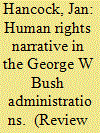

|
|
|
|
|
| Publication |
2011.
|
| Summary/Abstract |
This article examines the human rights claims made by the George W. Bush Administrations of their post 9/11 foreign and security policy. Two common scholastic explanations of this narrative are evaluated: (i) that human rights constitute, at least in part, independent foreign policy goals and; (ii) that the human rights claims of policymakers can be dismissed as hypocritical rhetoric. The article informs and progresses this debate by revisiting the works of the early twentieth century political culture theorists Gabriel Almond, Graham Wallas and Edward Bernays. The article details the consistent use of a human rights narrative by administration officials as a technique of political discipline. The article identifies five linguistic mechanisms through which this technique of discipline was made manifest in practice. The article thereby explains how a human rights narrative was employed as an instrument to inculcate, rather than describe, reality.
|
|
|
|
|
|
|
|
|
|
|
|
|
|
|
|
| 9 |
ID:
102444
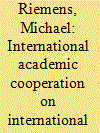

|
|
|
|
|
| Publication |
2011.
|
| Summary/Abstract |
Based on considerable archival research in Switzerland and France, this article considers the creation of specialised institutions and centres for scientific research, discussion and information on international questions after the First World War. It analyses the origins and development of the International Studies Conference from 1928 until 1946, and it pays particular attention to the institutional setting provided by the ISC. With the help of an international questionnaire of the League of Nations from the early 1930s the article also discusses the university teaching of IR in the US, Great Britain and on the European continent in the interwar period, and it looks at some of the institutional settings, especially academic institutions (departments, chairs, schools and so on), that were available at the time.
|
|
|
|
|
|
|
|
|
|
|
|
|
|
|
|
| 10 |
ID:
102430
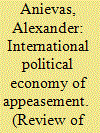

|
|
|
| 11 |
ID:
102428
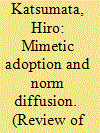

|
|
|
|
|
| Publication |
2011.
|
| Summary/Abstract |
The members of the Association of Southeast Asian Nations (ASEAN) have been pursuing new cooperative security agendas - namely, confidence-building measures (CBMs), preventive diplomacy (PD), conflict resolution and a set of agendas associated with security communities. The ASEAN members' pursuit of these agendas should be seen as a set of instances of their mimetic adoption of external norms for the sake of legitimacy. They have mimetically been adopting a set of norms associated with the collective management of conflicts, which have been practiced by the participant states of the Organisation for Security and Cooperation in Europe (OSCE). They have been doing so, with the intention of securing their identities as legitimate members of the community of modern states, and of enhancing the status of ASEAN and the ASEAN Regional Forum (ARF) as legitimate cooperative security institutions.
|
|
|
|
|
|
|
|
|
|
|
|
|
|
|
|
| 12 |
ID:
102427
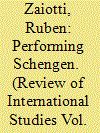

|
|
|
|
|
| Publication |
2011.
|
| Summary/Abstract |
Myth-making has historically been an essential component of the modern state's quest for territorial control and legitimacy. As a sui generis post-national political entity in search for identity and recognition, the European Union (EU) seems to mimicking its more established national counterpart. By formulating and reproducing a narrative that hails Europe's border control regime ('Schengen') as a success story of European integration and by deploying evocative imagery at Europe's common borders, the EU is in fact trying to establish itself as an integral part of the European political landscape. This article argues that what we are witnessing today in Europe is indeed the emergence of the 'myth of Schengen'; however, the regime's mythopoiesis goes beyond the EU's official narrative and symbolic representations. To capture the full range of actors, locations and activities involved in the establishment and reproduction of this post-national myth, it is necessary to shift the attention to the performative dimension of this process. To support this argument, the article relies on the insights of anthropological and sociological works that have emphasised the role of rituality and performativity in constituting social structures and identities. These insights are then applied to examine the rituals and performances characterising four cases of 'unofficial' Schengen myth-making beyond Europe: a hotel in Beijing, street kids in Kinshasa, a British music band, and a group of Eastern European artists.
|
|
|
|
|
|
|
|
|
|
|
|
|
|
|
|
| 13 |
ID:
102436


|
|
|
|
|
| Publication |
2011.
|
| Summary/Abstract |
This article examines the impact of the utilisation of the RMA on the part of the Colombian and US governments vis-à-vis the Farc. The central argument is that the RMA as applied in Colombia relies on newfangled and sometimes clever conceptions of force that have weakened the relative power of the Farc, but which fail to address the root causes of insurgency in the country that centre on profound economic inequity and violent political exclusion. Over 75 per cent of the $6 billion so far divulged through Plan Colombia has been devoted to military and police assistance, with the rest going to institutional programmes and to a lesser extent to social programmes. Although the insurgents are indeed weaker, as a result both of the RMA as well as misguided policies on the part of the guerrillas themselves, they are by no means 'broken'. Violent conflict in the country will likely persist into the foreseeable future.
|
|
|
|
|
|
|
|
|
|
|
|
|
|
|
|
| 14 |
ID:
102432
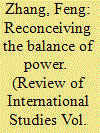

|
|
|
|
|
| Publication |
2011.
|
| Summary/Abstract |
Richard Little's new book has considerably widened the scope for thinking about the balance of power in International Relations (IR), both by beginning to provide a conceptual history of the idea and by expanding existing balance-of-power models. His concept of the associational balance of power is an important corrective to the prevailing realist understanding of the balance of power. However, Little does not explore more fully the relationship between the balance of power as a myth and a reality. Moreover, the usefulness of distinction between adversarial and association balance of power is not given a direct evaluation against the historical record, nor is his own composite model of the balance of power partly based on the distinction fully developed.
|
|
|
|
|
|
|
|
|
|
|
|
|
|
|
|
| 15 |
ID:
102441
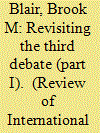

|
|
|
|
|
| Publication |
2011.
|
| Summary/Abstract |
D. S. L. Jarvis has led a spirited and well-considered polemic against post-structuralist and post-modernist theories of International Relations, arguing that they still leave much to be desired if they are to succeed in establishing a viable alternative to the traditional theoretical approaches of the field. While Jarvis and his cohorts have clearly delivered a great many important criticisms to this end, the question nonetheless remains as to how adroitly the foundational literature of post-structuralist and post-modernist thought has been deployed by the dissident school of International Relations theory. As this article argues, a return to the foundations of anti-foundationalist thought thus becomes a vital necessity if the footing of the 'third debate' is to be secured with some greater degree of perspicuity and, indeed, in a manner more fruitful for the study of International Relations. In so doing, it concludes that the 'power-knowledge' problématique has been poorly construed and must be revisited with much greater care and attention to some clear object of study if the post-structuralist and post-modernist ventures are ultimately to be fulfilled.
|
|
|
|
|
|
|
|
|
|
|
|
|
|
|
|
| 16 |
ID:
102426
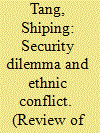

|
|
|
|
|
| Publication |
2011.
|
| Summary/Abstract |
I critically examine the existing literature on the security dilemma in ethnic conflict, thus laying part of the foundation for constructing a dynamic and integrative theory of ethnic conflict. I show that many attempts to apply the security dilemma to the understanding of ethnic conflict have been based on an imprecise and often mistaken understanding of the concept. I then emphasise that the security dilemma theory and the broader spiral model constitute a dynamic, versatile and powerful theory of strategic interaction that captures some general dynamics leading to the outbreak of war. As such, the security dilemma theory and the broader spiral model, when properly understood, can serve as part of the foundation of a dynamic and integrative theory of ethnic conflict, and such a theory will be able to integrate many diverse understandings of ethnic conflict from different schools of International Relations (IR) theory. I show the feasibility and the utility of such a theory.
|
|
|
|
|
|
|
|
|
|
|
|
|
|
|
|
| 17 |
ID:
102435
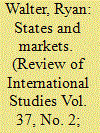

|
|
|
|
|
| Publication |
2011.
|
| Summary/Abstract |
Use of the 'states and markets' pair to conceptualise the international is pervasive. This article narrates the intellectual genesis of this dyad in eighteenth- and nineteenth-century British political œconomy. Adam Smith's arguments in Wealth of Nations are central, for there the analysis of strength is uncoupled from the analysis of wealth, de-politicising the international and making the economic denunciation of war possible. In the process the international economy is elaborated as a new theoretical object.
|
|
|
|
|
|
|
|
|
|
|
|
|
|
|
|
| 18 |
ID:
102434


|
|
|
|
|
| Publication |
2011.
|
| Summary/Abstract |
How do states attempt to mitigate the pressures of financial globalisation? This article suggests that options can be understood in terms of monetary regime choice. These are best understood with their international component included - whether states integrate unilaterally, integrate multilaterally, or go it alone monetarily. But to understand the international side of monetary relations, one must look to domestic political structures, histories and politics. It is important that to understand that within the pressures of the international system, domestic politics is a fons et origo determining the health and stability of international economic relations.
|
|
|
|
|
|
|
|
|
|
|
|
|
|
|
|
| 19 |
ID:
102431
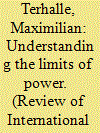

|
|
|
|
|
| Publication |
2011.
|
| Summary/Abstract |
The main thread of this review article is to identify the reasons of how to account for the trajectory of American power in the region. Leaving behind the vast amount of highly politicised and hastily compiled volumes of recent years (notwithstanding valuable exceptions), the monographs composed by Lawrence Freedman, Trita Parsi and Oliver Roy attempt to subtly disentangle the intricacies of US involvement in the region from highly distinct perspectives. One caveat for International Relations theorists is that none of the aforementioned authors intends to provide theoretical frameworks for his examination. However, since IR theory has damagingly neglected history in the last decades, the works under review here, at least in part, compensate for this disciplinary and intellectual failure.
In conclusion, Freedman's in-depth approach as a diplomatic historian, with its underlying reference to the various traditions in US foreign policy thinking, is most illuminating, while Parsi's contestable account focuses too narrowly on the Iran-Israel relationship. Roy's explications fail to show how and why the 'ideological' element in US foreign policy came to carry exceedingly more weight after 2001 than it did in the 1990s.
|
|
|
|
|
|
|
|
|
|
|
|
|
|
|
|
| 20 |
ID:
102439
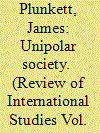

|
|
|
|
|
| Publication |
2011.
|
| Summary/Abstract |
This article aims to reassert the relevance of the international society approach by highlighting the value it could bring to the project of understanding the effects of unipolarity. Bull's approach to war and international law as 'institutions of international society' could help to frame our understanding of the way in which preponderance has impacted on war and law. Examining the phenomenon of bilateralism suggests that there is also value in a more general attempt to trace the effects of unipolarity on international society.
|
|
|
|
|
|
|
|
|
|
|
|
|
|
|
|
|
|
|
|
|